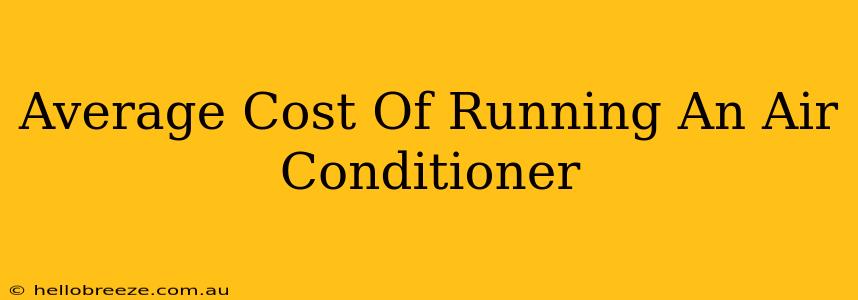Summer's heat can be brutal, and your air conditioner is your best friend during those scorching days. But how much does it really cost to keep your cool? Understanding the average cost of running an air conditioner is crucial for budgeting and making informed decisions about energy efficiency. This comprehensive guide will delve into the factors influencing AC running costs, providing you with the tools to estimate your own expenses and potentially lower your energy bills.
Factors Affecting Your Air Conditioning Costs
Several factors contribute to the overall cost of running your air conditioner. Let's break them down:
1. Your Air Conditioner's SEER Rating:
The Seasonal Energy Efficiency Ratio (SEER) is a crucial metric. A higher SEER rating signifies greater energy efficiency. Air conditioners with higher SEER ratings (16 or above) generally consume less electricity, leading to lower operating costs. Older units with lower SEER ratings will significantly increase your energy bill.
2. Size and Type of Your Air Conditioner:
The size of your air conditioner should match the size of the space it's cooling. An undersized unit will work harder and consume more energy, while an oversized unit might cycle on and off frequently, also impacting efficiency. The type of AC also matters; central air conditioning systems typically consume more energy than window units, but they also offer more consistent cooling.
3. Your Home's Insulation and Sealing:
Proper insulation and sealing are essential for energy efficiency. Air leaks let cooled air escape, forcing your AC to work harder to maintain a comfortable temperature. Investing in better insulation and sealing can dramatically reduce your energy consumption and lower your AC running costs.
4. Your Local Electricity Prices:
Electricity prices vary significantly by location. Areas with higher electricity rates will naturally see higher AC operating costs. Checking your electricity bill will provide the precise cost per kilowatt-hour (kWh), which is essential for accurate calculations.
5. Usage Habits:
How often and for how long you run your air conditioner directly impacts your costs. Setting your thermostat higher when you're away or using a programmable thermostat can significantly reduce energy consumption. Regular maintenance, including filter changes, also contributes to optimal efficiency.
Estimating Your Air Conditioning Costs
While providing an exact average cost is difficult due to the varying factors above, here's a general guideline:
- Low end: For a highly efficient unit, in a well-insulated home, with moderate usage and lower electricity prices, you might spend $50-$150 per month.
- Average: A typical home with a moderately efficient AC and average usage could see monthly costs in the range of $150-$300.
- High end: Homes with older, inefficient units, poor insulation, heavy usage, and high electricity rates might experience costs exceeding $300 per month.
Tips for Lowering Your Air Conditioning Costs
Here are some practical steps to reduce your energy consumption and save money:
- Regular Maintenance: Schedule professional maintenance annually to ensure your AC is running at peak efficiency.
- Clean or Replace Air Filters: Dirty filters restrict airflow, forcing your AC to work harder.
- Seal Air Leaks: Caulk and weatherstrip windows and doors to prevent air leaks.
- Use a Programmable Thermostat: Set it to automatically adjust temperatures when you're away or asleep.
- Plant Shade Trees: Trees can provide natural shade, reducing the amount of heat entering your home.
- Utilize Fans: Fans can help circulate air and reduce the need to run your AC constantly.
Conclusion
Understanding the average cost of running an air conditioner involves considering multiple factors. By making informed choices, improving home insulation, and adopting energy-saving habits, you can significantly reduce your energy bills and enjoy cool comfort without breaking the bank. Remember, regular maintenance is key to extending the life of your unit and maximizing its efficiency.

